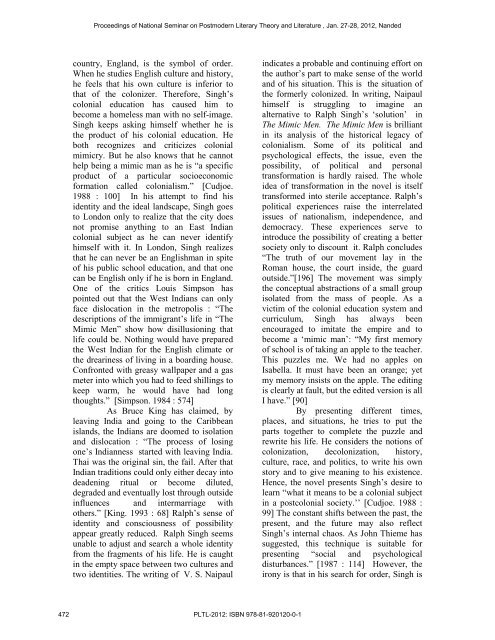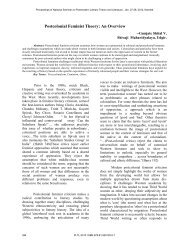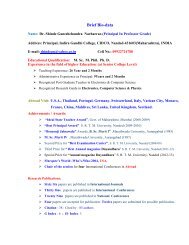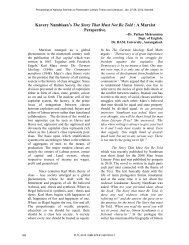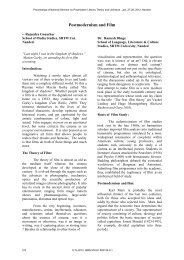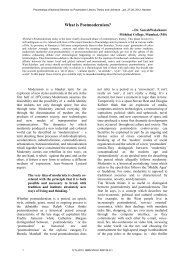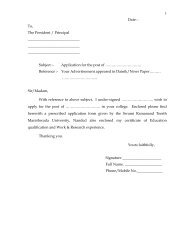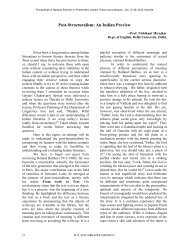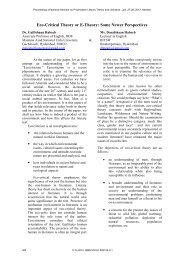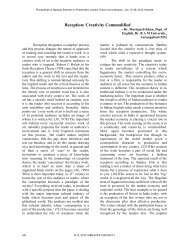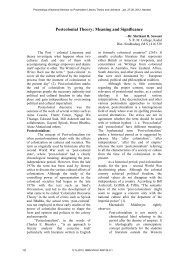Multiculturalism - Igcollege.org
Multiculturalism - Igcollege.org
Multiculturalism - Igcollege.org
You also want an ePaper? Increase the reach of your titles
YUMPU automatically turns print PDFs into web optimized ePapers that Google loves.
Proceedings of National Seminar on Postmodern Literary Theory and Literature , Jan. 27-28, 2012, Nandedcountry, England, is the symbol of order.When he studies English culture and history,he feels that his own culture is inferior tothat of the colonizer. Therefore, Singh’scolonial education has caused him tobecome a homeless man with no self-image.Singh keeps asking himself whether he isthe product of his colonial education. Heboth recognizes and criticizes colonialmimicry. But he also knows that he cannothelp being a mimic man as he is “a specificproduct of a particular socioeconomicformation called colonialism.” [Cudjoe.1988 : 100] In his attempt to find hisidentity and the ideal landscape, Singh goesto London only to realize that the city doesnot promise anything to an East Indiancolonial subject as he can never identifyhimself with it. In London, Singh realizesthat he can never be an Englishman in spiteof his public school education, and that onecan be English only if he is born in England.One of the critics Louis Simpson haspointed out that the West Indians can onlyface dislocation in the metropolis : “Thedescriptions of the immigrant’s life in “TheMimic Men” show how disillusioning thatlife could be. Nothing would have preparedthe West Indian for the English climate orthe dreariness of living in a boarding house.Confronted with greasy wallpaper and a gasmeter into which you had to feed shillings tokeep warm, he would have had longthoughts.” [Simpson. 1984 : 574]As Bruce King has claimed, byleaving India and going to the Caribbeanislands, the Indians are doomed to isolationand dislocation : “The process of losingone’s Indianness started with leaving India.Thai was the original sin, the fail. After thatIndian traditions could only either decay intodeadening ritual or become diluted,degraded and eventually lost through outsideinfluences and intermarriage withothers.” [King. 1993 : 68] Ralph’s sense ofidentity and consciousness of possibilityappear greatly reduced. Ralph Singh seemsunable to adjust and search a whole identityfrom the fragments of his life. He is caughtin the empty space between two cultures andtwo identities. The writing of V. S. Naipaulindicates a probable and continuing effort onthe author’s part to make sense of the worldand of his situation. This is the situation ofthe formerly colonized. In writing, Naipaulhimself is struggling to imagine analternative to Ralph Singh’s ‘solution’ inThe Mimic Men. The Mimic Men is brilliantin its analysis of the historical legacy ofcolonialism. Some of its political andpsychological effects, the issue, even thepossibility, of political and personaltransformation is hardly raised. The wholeidea of transformation in the novel is itselftransformed into sterile acceptance. Ralph’spolitical experiences raise the interrelatedissues of nationalism, independence, anddemocracy. These experiences serve tointroduce the possibility of creating a bettersociety only to discount it. Ralph concludes“The truth of our movement lay in theRoman house, the court inside, the guardoutside.”[196] The movement was simplythe conceptual abstractions of a small groupisolated from the mass of people. As avictim of the colonial education system andcurriculum, Singh has always beenencouraged to imitate the empire and tobecome a ‘mimic man’: “My first memoryof school is of taking an apple to the teacher.This puzzles me. We had no apples onIsabella. It must have been an orange; yetmy memory insists on the apple. The editingis clearly at fault, but the edited version is allI have.” [90]By presenting different times,places, and situations, he tries to put theparts together to complete the puzzle andrewrite his life. He considers the notions ofcolonization, decolonization, history,culture, race, and politics, to write his ownstory and to give meaning to his existence.Hence, the novel presents Singh’s desire tolearn “what it means to be a colonial subjectin a postcolonial society.’’ [Cudjoe. 1988 :99] The constant shifts between the past, thepresent, and the future may also reflectSingh’s internal chaos. As John Thieme hassuggested, this technique is suitable forpresenting “social and psychologicaldisturbances.” [1987 : 114] However, theirony is that in his search for order, Singh is472 PLTL-2012: ISBN 978-81-920120-0-1


